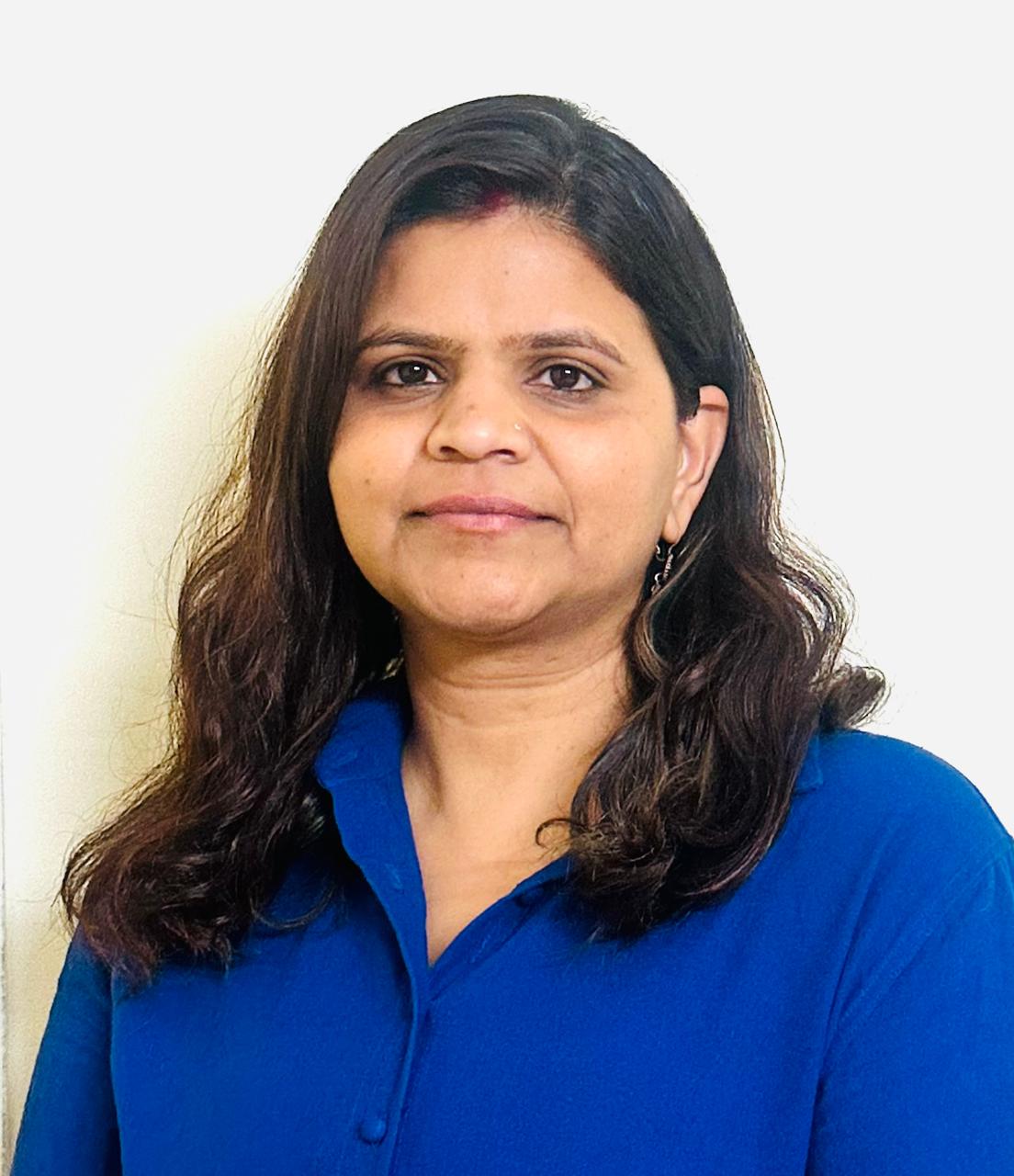
Shruti Tewari
- Home
- Faculty
- Full Time Faculty
- Shruti Tewari

Dr. Shruti Tewari is an Associate Professor at Indian Institute of Management, Indore. She is a trained social psychologist and holds a D. Phil degree in Psychology from University of Allahabad. Her doctoral research identified the mechanisms through which people with physical disabilities circumvent, avoid, and surmount the obstacles during their daily lives and achieve their life goals. She investigated process of coping with physical disability within the multivariate transactional model of stress. As a researcher and a trainer, she has worked extensively on stress and well-being for the last ten years.
She currently teaches Social Cognition, Brain talks at work, NeuroHR, Neuromarketing and Psychology of Managerial Decisions across various programmes (IPM, PGP, PGPMX, FPM and so on). These courses provide applications of social-cognitive theories in HR and marketing.
Prior to joining IIMI, she was a research director in an Indo-British collaborative project on social identity funded by Economic & Social Research Council, United Kingdom. Her Post-doctoral research at Centre of Behavioural and Cognitive Sciences focused on social cognitive research, specifically, on time perception, social identity, and attention. Her research employs mixed methods, combining qualitative methodologies with survey and behavioral experiments. Currently, she is working on projects related to health care management in mass gathering and intergroup cognition.
She has received national and international research grants including Department of Science and Technology (DST), Ministry of Science and Technology, Government of India and New Zealand India Research Institute, Victoria University of Wellington, New Zealand. She has published extensively in international journals and book chapters. Recently, she guest-edited a special issue on ‘Neuroscience & HR’ in NHRDN Journal published by Sage. She has also worked as advisor in NGOs in India and UK.
2020
Singh. P., Tewari, S., Kesberg, R., Karl, J. S., Bulbulia, J. & Fischer, R. Time investments in rituals are associated with social bonding, affect and subjective health: A longitudinal study of Diwali in two Indian communities. Philosophical Transactions of the Royal Society B: Biological Sciences. (Impact factor 3.09, A* in SJR-ABDC equivalence list)
Reicher, S., Hopkins, N., Clifford, S., Shankar, S. Pandey, K. & Tewari, S. Identity enactment as collective accomplishment: Religious identity enactment at home and at a festival. British Journal of Social Psychology. {A category in ABDC}
2019
Hopkins, N., Reicher, S., Clifford, S. Pandey, K., Shankar, S. & Tewari, S. Social relations in crowds: Recognition, validation and solidarity. European Journal of Social Psychology, 49, 1283-1297. {A category in ABDC}
2018
Tewari, S. & Mahapatra, G. Social Neuroscience & HR: An Introductory perspective. NHRD Network Journal, 11 (4). Sage Publications.
Tewari, S. & Gupta, A. Pre-suasion: a revolutionary way to influence and persuade. Journal of Marketing Communications, DOI: 10.1080/13527266.2018.1504811 (B Category in ABDC)
2016
Tybur, JM, Inbar, Y, Aarøe, … Tewari, S., Wilson, C., Yong, J.C. and Iris Žeželj. Parasite stress and pathogen avoidance relate to distinct dimensions of political ideology across 30 nations. Proceedings of National Academy of Sciences, 113 (44) 12408-12413. (A* SJR_Impact factor-9.423, Citation: 30)
2015
Reicher, S., Hopkins, N., Khan, S. S., Tewari, S., Srinivasan, N., & Stevenson, C. Explaining effervescence: How shared social identity produces positive experiences in crowds. Cognition & Emotion (impact factor 2.31, Citation: 39)
Srinivasan, N., Tewari, S., Makwana, M. & Hopkins. N. P. Attention Mediates the Effect of Context-Relevant Social Meaning on Prospective Duration Judgments. Timing & Time Perception. Brill. (Citation 5)
Khan, S., Hopkins, N., Reicher, S., Tewari, S., Srinivasan, N., Stevenson, C. How Collective Participation Impacts Social Identity: A Longitudinal Study with Control Data. Political Psychology. (Impact Factor: 1.77, Citation 28)
Khan, S., Hopkins, N., Reicher, S., Tewari, S., Srinivasan, N., Stevenson, C. Shared identity predicts enhanced health at mass gatherings. Group Processes & Intergroup Relations (B Category in ABDC, Impact Factor 1.46, Citation 34)
2014
Khan, Hopkins, N., S., Tewari, S., Srinivasan, N., Reicher, S. D. & Ozakinci, G. Efficacy and well-being in rural north India: The role of social identification with a large-scale community identity. European Journal of Social Psychology, 44(7), 787-798. (A category in ABDC, Impact factor: 1.77, Citation 18).
2013
Shankar, S., Stevenson, C., Pandey, K., Tewari, S., Hopkins, N., & Reicher, S. D. A calming cacophony: Social identity and the experience of noise at the Magh Mela in Allahabad. Journal of Environmental Psychology.36, 87-95. (Impact factor: 2.17, citation: 37)
2012
Tewari, S., Khan, S.S., Hopkins, N., Srinivasan, N., & Reicher, S. Participation in mass gatherings can benefit well-being: Longitudinal and control data from a North Indian Hindu pilgrimage event. PLOS ONE, 7(10): e47291 (Impact factor: 4.45. citation : 81)
2011
Pande, N., & Tewari, S. Understanding Coping with Distress due to physical disability, Psychology and Developing Societies, Vol. 23(2). pp. 177-209. (citation 5)
2009
Singh, P., Pandey, J., Tewari, S, Pandey, K., & Maurya, M. Perceived justice of available opportunities and self-esteem, collective self-esteem and social exclusion: a study of three religious groups in India, Psychological Studies, Vol. 54, June, 2009, pp.124-132. (Citation 6)
2007
Prayag Magh Mela Research Group. Living the Magh Mela at Prayag: collective identity, collective experience and the impact of participation in a mass event. Psychological Studies, 52 (4), 293- 301. (Citation 19)
Prayag Magh Mela Research Group. Revisiting research practice in India. Psychological Studies, 52 (4), 302- 310.
Prayag Magh Mela Research Group. Experiencing the Magh Mela at Prayag: Crowd, categories and social relations. Psychological Studies, 52 (4), 311- 319.
Book Chapters
2018 Tewari, S (2018). Structural Equation Modelling Using AMOS. Psyber News, Vol 8, (2) ISSN-09760709.
2015 Hopkins, N., Stevenson, C., Shankar, S., Pandey, K., Khan, S. & Tewari, S. Being together at the Magh Mela: The social psychology of crowds and collectivity. In Gale, T. Maddrell, A., & Terry, A. (eds.). Sacred Mobilities. Ashgate: Farnham. (Citation 12)
2014 Pande, N. & Tewari, S. Psychology and Physical Disability Policies. In Tripathi, R. C. (Ed.), Psychology and Social Policies in India, Springer Publications. pp. 171-192.
2009 Tewari, S. Role of Women in Changing Rural India. In Agarwal, B. (Ed.), Changing Rural India, ABD Publisher, Jaipur, pp. 147-166.
2007 Tewari, S. Coping with Physical Disability. In Tripathi, R. (Ed.), Proceedings of National Seminar on Human Rights and Empowerment of Weaker Section: Children, Women, Dalits, Seniors and Disabled. Dikshit Press, Allahabad, pp. 217-225.

